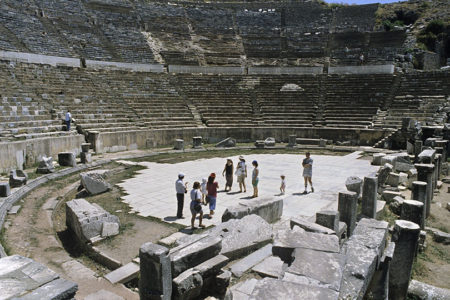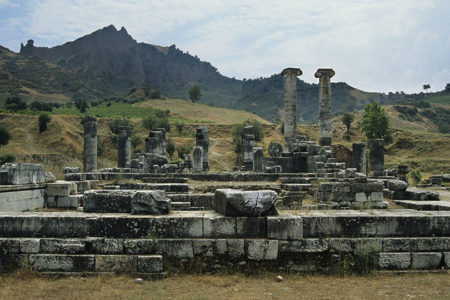Sardis: Averting Spiritual Suicide Revelation 3:1–6
Seventy-five miles northeast of Ephesus lay the church at Sardis, which received a blunt message from its Builder, the Possessor of the “seven stars.” He shocked the leader at Sardis with His analysis: the church was dead.
And to the angel of the church in Sardis write, “These things says He who has the seven Spirits of God and the seven stars: ‘I know your works, that you have a name that you are alive, but you are dead’” (Rev. 3:1).
Jesus’ self-description at the outset of His letters to the churches in Revelation was fitted to their circumstances. To Sardis He was the dynamic Source of life, the Possessor of “the seven Spirits who are before [God’s] throne” (1:4).
His message that Sardis’ spiritual life was a façade came as a stinging rebuke: “Be watchful, and strengthen the things which remain, that are ready to die, for I have not found your works perfect before God” (3:2). The words watchful and strengthen confirm the metaphor of death, referring to living in a state of self-centeredness.
How does this happen? How can a church that seems alive actually be spiritually dead? To the human eye, the Sardis church was thriving; but Jesus was not impressed. Scripture teaches, “You are that one’s slaves whom you obey, whether of sin leading to death, or of obedience leading to righteousness” (Rom 6:16).
Nonspiritual living produces an estrangement from God that is characterized as death despite pleasing appearances and programs. Converse -ly, living consistently under the Holy Spirit’s direction and control produces an existence energized by God and characterized as life: “For the wages of sin is death, but the gift of God is eternal life in Christ Jesus our Lord” (Rom. 6:23). Sardis was dead; without the Holy Spirit’s energizing, the church was producing worthless “wood, hay, straw” (cf. 1 Cor. 3:12–15).
Jesus prescribed the necessary corrections:
Be watchful, and strengthen the things which remain….Remember therefore how you have received and heard; hold fast and repent (vv. 2–3).
Watch. “Be watchful” indicates the drift into Spiritless living was not intentional. Blunted sensitivity to genuine spiritual life caused religious carnality. Satisfied with the status quo, these believers experienced spiritual asphyxiation. Spiritual stupor prevents the necessary correction and prompts Jesus’ judgment, which He will bring suddenly, like a thief. Spiritual sensitivity comes by humble self-examination in the light of God’s Word.
Strengthen. The word strengthen means to “establish” or “confirm”—to secure the elements that are good, truly spiritual, and therefore of value. Stop the downward slide. Reestablish genuinely spiritual works, habits, and endangered past practices. Secure the good that remains.
When a major Protestant group was recently alerted to its liberal drift, a handful of people accepted the warning signs, drafted a plan to secure what remained, and retook much of the ground that had been lost. Sardis was told to wake up and confirm the truly spiritual works because its divinely designated agenda was not yet fulfilled.
Remember. Referring to the joy with which they had received the gospel, Jesus urged believers to revive their original enthusiasm. Routine and carnality are subtle enemies of enthusiasm and joy (no wonder it’s called “death”). Reestablishing God’s purpose for one’s life requires regaining lost joy. Jesus was not talking about short-lived, weekend worship or retreat reverie but a renewed spiritual fervor that produces joy in life’s trenches. Not only was Sardis to remember its fervor, it was to “hold fast.” Leading folks to personal faith in Jesus is the best way to maintain godly joy.
Repent. While the first three steps are present tense, indicating ongoing activities, repent is once-and-done action (aorist imperative). Like reversing direction on a highway, fulfilling their destiny demanded these Christians’ commitment to genuine Holy Spirit control. Those who had not succumbed to the carnal religiosity of the majority were to be commended heartily because, like one bad apple, a carnal believer corrupts many others (1 Cor. 15:33).
The majority needed to reverse course and join the ranks of the faithful. God always has a remnant—“a few names even in Sardis who have not defiled their garments” (v. 4). These had not committed spiritual suicide, as so many of their colleagues had, but sought God’s ideals and values instead of imposing their own. J. I. Packer mentioned a friend who remained faithful under similar pressure:
I walked in the sunshine with a scholar who has effectively forfeited his prospects of advancement by clashing with church dignitaries over the gospel of grace. “But it doesn’t matter,” he said at length, “for I have known God and they haven’t.”1
Such faithful saints do not permit the politics and practices of their carnal colleagues to infect their integrity or enthusiasm for Jesus. In Sardis, they resisted the spiritual death that characterized their church. Consequently, Jesus told them, “they shall walk with Me in white, for they are worthy” (v. 4). Many fine Christian organizations have been satanically sabotaged by one or two influential people whose failure to walk in the Spirit infected many of their colleagues.
Jesus then offered similar incentives to the entire church:
He who overcomes shall be clothed in white garments, and I will not blot out his name from the Book of Life; but I will confess his name before My Father and before His angels (v. 5).
He promised that overcomers will be clothed in white and have their names protected2 in the Book of Life and confessed (heralded, perhaps) before God and the angels.
The term overcomer indicates a battle. Jesus Himself overcame when He rejected the desires of the flesh and submitted Himself completely to the Father’s will and the Spirit’s control (v. 21). He expects the same of His followers.
God’s children overcome by their faith in Him who has the power and authority to defeat the evil one (1 Jn. 5:4).
ENDNOTES
- I. Packer, Knowing God (Downers Grove, IL.: InterVarsity Press, 1973), 20.
- “Not blot out,” or “not erase” (v. 5) is a figure of speech called litotes, wherein emphasis is added by denying the opposite of something. Jesus did not imply that erasure from the Book of Life was possible but emphasized the security of those who endured.






